Station Eleven by Emily St. John Mandel
Can I just say that I loved this book? Post-apocalyptic WITHOUT zombies. Intersecting narratives that all connect. Beautiful descriptions. A portrait of Hollywood. A comparison to a space-themed graphic novel. Character growth.
Station Eleven hooked me. It starts in Toronto, where an actor has a heart attack onstage during King Lear. A young man rushes up to save him but cannot while a young girl looks on. Meanwhile, a pandemic is beginning to spread, and most of the people in the theater will be dead within weeks, if not hours. The narrative weaves in and out of the past and the future, alternating between characters that are all somehow connected, but not all of the connections are yet apparent.
I really enjoyed the slow unraveling of the backstories of the different characters, and the world building of the post-apocalyptic world. I watch The Walking Dead, so I’m used to characters roaming around from place to place, scavenging for survival, but this world didn’t have the added threat of zombies, so for a character to go twenty years without killing another person seems reasonable, though still surprising. I also really loved the idea of the Traveling Symphony (and theater group), who wandered from town to town, playing Beethoven and Bach and other music in a world without, while the actors put on Shakespeare plays, a nod to the mirrored and ragged worlds they and Shakespeare lived in, pre- and post- technology.
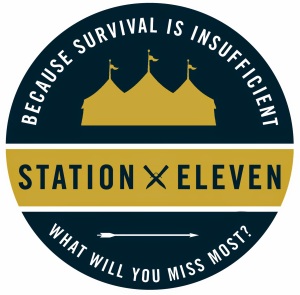 Juxtaposed with the current world, where people “kept getting trapped behind iPhone zombies, people… who wandered in a dream with their eyes fixed on their screens,” and lived lives like ghosts and sleepwalkers, unhappy but not realizing so; the post-apocalyptic world, for some, was an improvement. Life had a purpose once more, if only to survive the day. Yet others are constantly searching for traces of the former world, exploring lost buildings and houses, holding on to scraps from gossip magazines and the world from whence they came, building a Museum of Civilization, before it becomes lost forever.
Juxtaposed with the current world, where people “kept getting trapped behind iPhone zombies, people… who wandered in a dream with their eyes fixed on their screens,” and lived lives like ghosts and sleepwalkers, unhappy but not realizing so; the post-apocalyptic world, for some, was an improvement. Life had a purpose once more, if only to survive the day. Yet others are constantly searching for traces of the former world, exploring lost buildings and houses, holding on to scraps from gossip magazines and the world from whence they came, building a Museum of Civilization, before it becomes lost forever.
The world built seemed real, the characters’ reactions seemed real, and the “bad guy” was just a poor kid who dealt with PTSD in a way he found comforting (if, albeit, it turned creepy). I found the details realistic and appropriate (the south is dangerous because of all the guns, for instance), and the characters were just trying to cope and survive and remember. I loved reading about how all the characters reacted to the pandemic, to the failing news, to the loss of electricity and technology and cars.
The ending is slightly bittersweet, with a hint that the world may be improving, and the characters adjusted to their current lives. I was really hoping the final character would somehow intersect the others, but in a world where states and countries and lines don’t exist, and traveling requires walking or on horseback, it seemed unlikely they ever would, and that’s okay, because sometimes that’s just how life is, and the catalyst for the story, the fateful King Lear production all those years ago, is part of a completely different world.
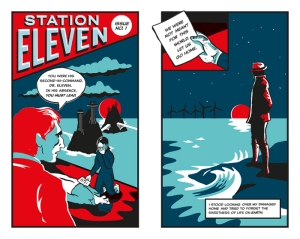 And throughout the book is the graphic novel, Station Eleven, from whence the book got its name. Drawn by one of the characters, its limited release of 100 copies of two issues becomes so important to many of the characters within the novel, and yet also acts as a mirror to the story unfolding. I thought the idea was brilliant, and it was yet another way to bring characters together through time, and I’d really like to see an actual Station Eleven graphic novel made.
And throughout the book is the graphic novel, Station Eleven, from whence the book got its name. Drawn by one of the characters, its limited release of 100 copies of two issues becomes so important to many of the characters within the novel, and yet also acts as a mirror to the story unfolding. I thought the idea was brilliant, and it was yet another way to bring characters together through time, and I’d really like to see an actual Station Eleven graphic novel made.
I knew I loved the book because after I put it aside for the night, I couldn’t stop thinking about it and the world of the book. I thought about what I would do, what book(s) I would bring for the end of the world (Harry Potter and the Deathly Hallows and Anne of Green Gables, maybe? Or The Night Circus, or maybe even Pride and Prejudice), and where I would go. My other half and I have discussed this before (his mom’s house to meet up with everyone, then maybe my dad’s because he’s in the country and has guns), but would I survive in Station Eleven? Who knows. But I still loved it anyway.
5 stars.
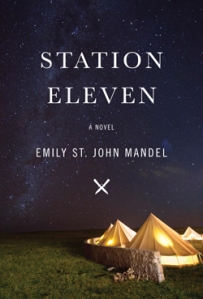
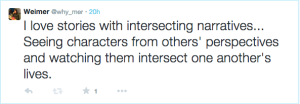
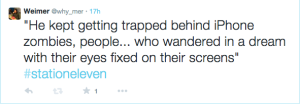

I also loved the intersecting narratives. I kept trying to figure out how the characters would all connect eventually. I think I have been reading too much epic fantasy, though. I kept expecting major conflicts and battles, but they were all more low-key and realistic, still dangerous but not drawn out and pivotal.
I really liked Kirsten. Of all the characters she represents the spirit required in this new world. She is resourceful and strong, caring and emotional, but deadly when she must be. She enjoys finding reminders of the world she cannot really remember, but she is fully invested in the new world, neither romanticizing nor mourning the old.
I wanted the Symphony to get back their old world in as much as they could, but that just wasn’t a realistic dream. At least there is hope of a better future ahead, maybe electricity?
All in all this was a very enjoyable and satisfying read. I’ll have to see what else she has written!
LikeLike
Kirsten was my favorite character as well… I found her incredibly well rounded and adjusted (considering), and I thought her keeping the clippings of Arthur bittersweet and lovely.
LikeLiked by 1 person